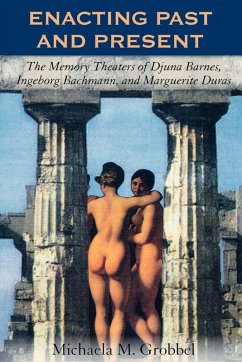Through a discussion of Walter Benjamin, Sigmund Freud, Mieke Bal and others, author Michaela Grobbel focuses on the work three women authors as types of performance which lead to re-presentations of memory. These women writers foreground the present but also critically demonstrate the complex relationship of the present to the past. Grobbel's work is a critical addition to any discussion of feminism, memory and literary modernism.
Hinweis: Dieser Artikel kann nur an eine deutsche Lieferadresse ausgeliefert werden.
Hinweis: Dieser Artikel kann nur an eine deutsche Lieferadresse ausgeliefert werden.
Michaela Grobbel's careful and insightful readings of modernist prose texts by Djuna Barnes (Nightwood 1936), Ingeborg Bachmann (Malina 1971), and Marguerite Duras (Le Ravissement de Lol V. Stein 1964) explore a 'new feminist art of memory,' that-in contrast to the classical rhetorical art of memory-is centered on the return of the (female) body within the production of memory and writing... This study is particularly relevant in light of the fact that neither the 'gender of memory' nor the aesthetic transposition of memory as inflected by gender have been the focus of recent research... Enacting Past and Present is an insightful, provocative, and discerning contribution to the evolving field of writing, memory, and culture. -- Susanne Baackmann German Quarterly Enacting Past and Present invites us to reconsider memory as process and performance; it does so through insightful commentary on three important women's texts; and it makes a convincing case for the importance of restoring the materiality of gender to any such consideration. -- Karen Kaivola Biography

